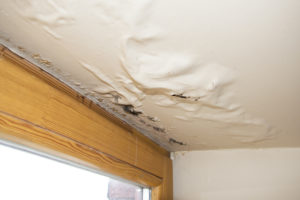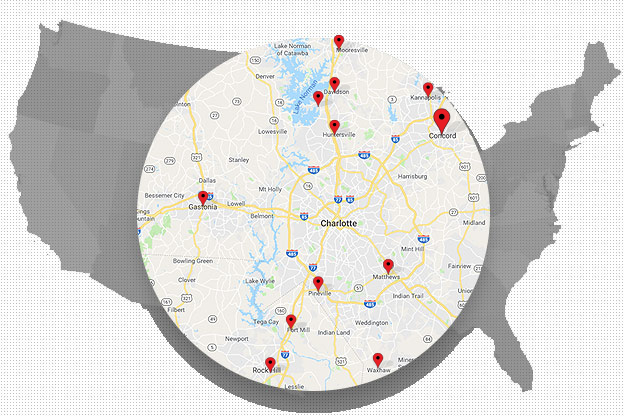Water in the Basement? Here’s What to Do, the Causes, and Prevention

Water in the basement is a common complaint among many homeowners.
You may find that your leaky basement is a constant problem. A musty smell or uncomfortable dampness keeping you from using the space.
It’s so common people consider it normal.
Or your basement is well used until a strong storm blows in. Without proper preparation, you can experience thousands of dollars in damages.
Luckily, there are ways to solve and prevent the issue.
What Causes Water in the Basement?
There are a few reasons why you might find water leaking in your basement. The most common reason is a heavy rainfall that seeps in through the home’s foundation.
Loose soil surrounding the foundation can absorb water, add pressure, and create cracks where water leaks through. The type of land your home is built on can determine how fast this process will take place.
Window wells are another entry point for rainwater. If your well isn’t properly installed, it could allow water to leak into your basement.
Wells should be free of leaves and debris to avoid clogs.
Clogged gutters may also cause water leakage. If gutters overflow during a rainstorm, the excess water can pool up around the soil and foundation. The same as loose soil, you’ll now have pressure building up and potential cracks.
Leaky Basement… Now What?
When the worst has happened and you have water in your basement, you have to act fast. Damage to your basement is damage to the foundation of your home.
Protect Your Belongings
It’s common to store photos, clothes, and more in the basement. As a convenient storage solution, you can’t beat it!
This creates a problem when water gets in.
Move your belongings off the floor and take outside anything that might attract mold. Blankets, toys, and furniture will need a good cleaning. If the weather allows, place your belongings outside and in the sun to dry effectively.
Your homeowner’s insurance will not always cover the damage. Coverage varies between plans and companies. You may have to purchase additional flood coverage or suffer the losses on your own.
Water We Do Now?
A wet-dry vacuum is a quick and easy solution to remove standing water. These vacuums are widely available for purchase or to rent but are best for smaller jobs.
Water that is too deep to remove with a vacuum will need a specialist. Calling the plumber is your only option if your leaky basement has gotten out of hand.
You’ll be spending a lot of time, energy, and money to clean things up. To stop a leaky basement, prevention is key.
How Can I Prevent Future Water Leaks?
Once you’ve figured out why you have a leaky basement you can start working on keeping that water out for good.
Choices vary based on your personal needs and your unique basement. You’ll need to work with a specialist to decide on the best fit.
Proper installation and management is key if you want to keep your basement dry.
Sump Pump
The most efficient way to remove water in the basement is to get a sump pump.
A sump pump is installed in the basement or crawl space of a house along with a sump pit. Any water that gathers in the pit is pumped away, protecting your basement.
While a sump pump is great for removing water it will not stop water from entering your basement. This method only works to remove water in the basement, not prevent it.
Gutter Improvements
Another solution is to add gutter extensions. This method is helpful if your downspouts are shooting water less than 5 feet from your house.
Rainwater must flow away from your home and gutter extensions will direct its path.
Drains
You may also decide to install a French drain. This system involves digging out a ditch and filling it with gravel and a pipe to divert water away from your home.
French drains function similar to gutter extensions. You may find the appearance of one more appealing than the other.
You can use any combination of gutters, drains, and pumps to avoid a leaky basement.
Water Proofing
If your current basement or crawl space is unfinished, you may opt to encapsulate the space.
This process includes installing a sealer liner to the floor and walls of your basement.
Not only will encapsulation prevent a leaky basement, but it will save you money. The encapsulated area will be much more efficient by not allowing outdoor air inside.
With encapsulation, you save on heating and cooling while staying dry.
Why Care Is Important
Water in the basement can cause mold to build up in your home.
If you suspect you have an issue with mold or mildew, it is important to target and remove it as soon as possible. Mold not only makes your home smell musty, but it can cause health issues.
If you or your family experiences any of the following it’s time to address your leaky basement:
- Headaches
- Runny nose
- Sore throat
- Rashes
- Memory loss
Mold remediation is the best course of action in this case. A professional will remove all affected insulation and provide a thorough chemical cleaning.
Hire the Experts
A leaky basement is a problem that affects not only your home but your health.
You can take the time to prepare for the worst, or you can provide your basement with the best. Make an investment into your home by avoiding water in the basement.
With over 20 years of experience, our team of experts is ready to help. Contact us today to begin improvements!
Recent Posts
- How Crawl Space Encapsulation Benefits the Environment – An Expert Guide
- 6 Ways Professionals Keep Your Crawl Space in Top Shape
- Structural Repair Solutions for Crawl Spaces, Basements, and Foundations
- Essential Crawl Space Repair Tips Every Homeowner Should Know
- The Importance of Radon Mitigation: Ensuring a Safe Living Environment for Homeowners
Categories
- Basement Mold
- Basement Waterproof Foundation
- Basement Waterproofing
- Crawl Space Dehumidifier
- Crawl Space Encapsulation Cost
- Crawl Space Repair
- Crawl Space Waterproofing
- Encapsulation
- Foundation Repair
- Foundation Waterproofing
- French Drains
- Leaky Basement
- Mold Remediation
- Mold Removal
- Radon
- Slab Jacking
- Sump Pump
- Uncategorized
- Vapor Barrier
- Water Leak
- Waterproofing
- White Mold
Archives
- June 2024
- May 2024
- March 2024
- January 2024
- June 2023
- May 2023
- April 2023
- March 2023
- February 2023
- January 2023
- December 2022
- November 2022
- October 2022
- September 2022
- August 2022
- July 2022
- June 2022
- May 2022
- March 2022
- February 2022
- January 2022
- December 2021
- November 2021
- October 2021
- September 2021
- August 2021
- July 2021
- June 2021
- May 2021
- April 2021
- March 2021
- February 2021
- January 2021
- December 2020
- November 2020
- October 2020
- September 2020
- August 2020
- July 2020
- June 2020
- May 2020
- April 2020
- March 2020
- February 2020
- January 2020
- December 2019
- November 2019
- October 2019
- September 2019
- August 2019
- July 2019
- June 2019
- May 2019

